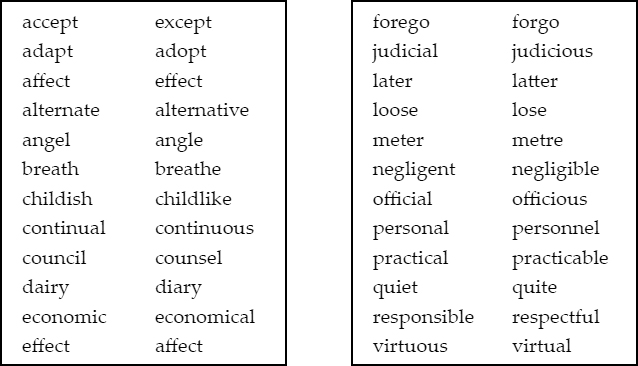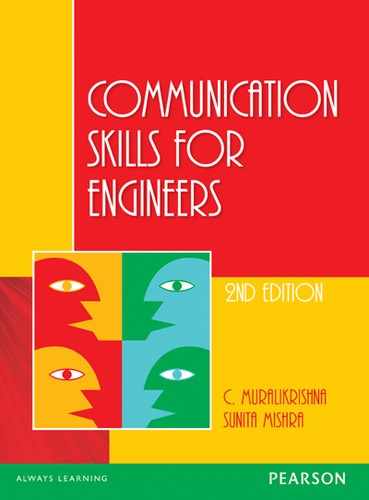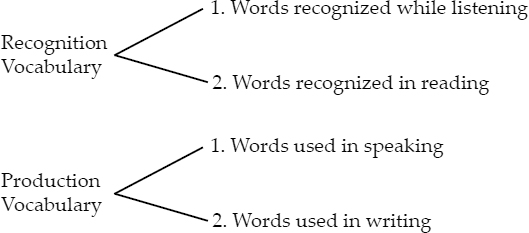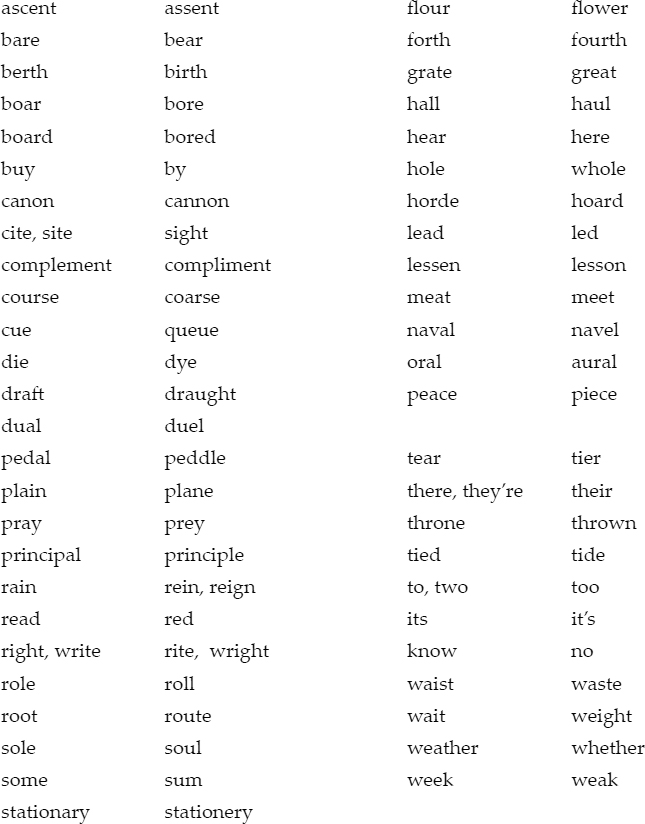APPENDIX A
Vocabulary Expansion
THE IMPORTANCE OF VOCABULARY
Though symbols, signs, and gestures are used significantly for human communication, it is basically through words that we think and convey our feelings, ideas, and needs to others. Our understanding of the thoughts of others is largely done through words. This ability to understand and communicate depends to a large extent on the size and accuracy of a person's vocabulary, i.e., the total number of words known and used by the person. In order to speak and write effectively, it is necessary to acquire sufficient and diversified vocabulary. This can be done through extensive listening and reading but this process requires much time before it produces appreciable results. Hence a systematic study is needed for enlarging and enriching one's vocabulary. In this appendix, you can study some aspects relating to English vocabulary, which would enable you to express yourself effectively and precisely in speech and writing.
English Vocabulary
Of all the languages in the world, English has the richest and most extensive vocabulary – nearly a million words. Half of them are listed in the Oxford English Dictionary; the other half remain uncatalogued. In comparison, the French language has about 1,00,000 words and German about 1,85,000. No one can ever hope to learn the million words in English nor is it necessary to learn them all as most of them are superfluous to the normal requirements of an ordinary person. The size of a person's vocabulary is determined by the nature of his work and interests. Thus, a scholar will need more vocabulary than a manual worker. It is desirable, however, for everyone to have a vocabulary in the range of 20,000 to 30,000 words, consisting of both receptive and productive categories.
Recognition and Production Vocabulary
All persons have two categories of vocabulary-words they can recognize while listening and reading and words which they can actually use in speaking and writing. The first category is known as Recognition or Passive Vocabulary and the second as Production or Active Vocabulary.
A person's recognition vocabulary is words he she can more or less understand when he/she hears them, or reads them without being sure of their meaning. Production vocabulary is words a person can actually use in speech and writing without doubt or hesitation. The two, however, will not remain constant. Words will move from recognition to production vocabulary when their spelling, pronunciation, meaning, grammar and usage are mastered and when they are used in speech and writing. If neglected, they would be forgotten or remain passive.
Content and Function Words
Words in English can also be classified into two groups-content and function words. Content words are those that express meanings like names (nouns), actions (full verbs) and qualities (adjectives and adverbs). They are unlimited in number, which goes on increasing with time.
In contrast, function words are almost empty of meaning individually. They are grammatical or structural Words like articles, prepositions, conjunctions, pronouns and auxiliary verbs which are required for grammatical construction of phrases, clauses and sentences. They are limited in number (about 160).
Confusibles
There are many English words that are somewhat similar in sound and/or spelling though they are different in meaning. This often leads to confusion and misuse. So, whenever you are in doubt, you must look them up in a dictionary to be quite clear about the differences in their use. Words which often cause confusion can be divided into the following groups.
a. Homophones
Words that sound alike but have different spellings and meanings, are a common source of confusion. Below is listed a selection of such pairs of words.
![]()
b. Homographs
Homographs are words that have the same written form but different pronunciations and meanings.
Examples: lead—lead; tear—tear
c. Homonyms
Homonyms are words that are both spelt and pronounced alike but have different meaning.
Example: bear, to bear
d. Confusing pairs of words

e. Collocation
Collocation deals with “what usually goes with what” i.e., an arrangement of words which sounds very acceptable. Faulty collocation leads to comic effect, as for example, if someone were to say, “I want a cup of powerful coffee” instead of “I want a cup of strong coffee”. In English, the words “strong” and “coffee” collocate, i.e., usually go together. Similarly, it would be wrong, to say, “I don't want to speak a lie” instead of “I don't want to tell a lie” or “He is a far relation of mine” instead of “He's a distant relation of mine”. You can find out about correct collocation of English words by referring to any ELT dictionary.
Phrasal Verbs
Phrasal verbs are idiomatic verb forms made up of a verb and an adverb particle i.e., they are made up of two words or sometimes three words. These verb-adverb combinations have meanings which cannot be built up from the meanings of the individual verb and adverb. Phrasal verbs thus are verbs plus prepositions or adverb complexes that acquire idiomatic meanings. A new verb with a different meaning is produced by a phrasal verb. For example, the expression go with when used as a phrasal verb means to take the same view as and not accompany.
Sometimes the meaning of a phrasal verb can be similar to the original verb as in the following. Example: The train slowed down very much before reaching the station (speed has become slow).
Look at other examples
- I get up at 6 in the morning. (wake up)
- The plane took off at 12 in the afternoon. (lifted itself in air)
- We shall pick you up outside the bus stand. (receive someone with a vehicle to go back)
- Arun wants to give up smoking at last. (stop a long habit or practice)
- I can't go with you on that point. (agree with)
Phrasal verbs can also have more than one idiomatic meaning:
Example:
Sambar goes with (suits) idlis very well.
English is very rich in phrasal verb usage. Phrasal verbs can be learnt easily with the help of a dictionary and also by thinking out situations in which they can be used.
Examples:
Who's looking after (taking care of) the children?
He looks down on (disdains) all his relatives.
He looked through (examined) the accounts for her.
Things are looking up (improving).
He always looked up to (respected) her.
Look at the following list of some important phrasal verbs:
Idiomatic Expressions
Idioms are expressions peculiar to a language. They are fixed group of words the meaning of which cannot be inferred from an understanding of the component parts. They have only one form and can be used in only one way. English is very rich in idioms and the accurate and appropriate use of idioms is necessary for vividness and variety of writing and speaking.
Do not look for the literal meaning of an idiomatic expression. Thus, if somebody advices you not to put all your eggs in one basket or not to count your chickens before they are hatched he is not talking about poultry precautions but only cautioning you not to risk everything on one attempt, and also not to depend on something before it materializes. Thus, the special meaning attached to an idiom must be learnt carefully.
The form of an idiom is unchangeable and has to be learnt whole. It cannot be changed at will. Thus, the idiom to rain cats and dogs meaning to rain heavily cannot be changed to ‘to rain dogs and cats’ or ‘to rain a cat and a dog’.
There are idiomatic combinations of a verb and adverb, or a verb and preposition (or verb with both adverb and preposition). Such combinations are called phrasal verbs as we have seen in the previous section. As in the case of idioms, their meanings cannot be guessed from the meaning of the verb alone. Apart from ‘phrasal verbs’, idioms are also formed by making use of other parts of speech. Here is a list of idiomatic phrases using the word ‘mind’ (noun):
- bear/keep in mind: to remember
Please bear in mind my words.
- be in one's right mind: to be mentally well
Are you in your right mind to suggest this?
- be of one mind: to have the same opinion
All the officers are of one mind about the problems.
- be of/in two minds: to be undecided
As the organizers were of/in two minds, it was not possible to come to a decision.
- be out of one's mind: to be mentally ill
The old man is out of his mind as seen by his behaviour.
- Call to mind: to remember
Try however hard, I am not able to call to mind the lines in question.
Important English Idioms
The following list presents a collection of important idioms employed most frequently in written and spoken English, today. The list contains only pure idioms i.e., fixed expressions whose meanings are quite different from the literal sense of the words. Semi-idioms, phrasal verbs and proverbs are not included in the list.
SINGLE WORD SUBSTITUTES
Linkers or Thought Connectives
Read the following sentences and note the underlined phrase in them:
- He engages himself in social work in addition to being the secretary of a flat owners' association.
- She worked very hard to get that job, however, she was not lucky enough to get it.
- The temperature appears to be stable, although it has been raining for the last two days.
- He is good at mathematics, but weak in grammar.
- She is good at painting and playing music.
The words/expressions underlined in the above sentences are called linkers or thought connectives. Using the correct linkers helps us in sequencing and linking up ideas and concepts in a piece of writing. Here are five sets of some important linkers that we use in our different forms of writing and speaking:
- in addition to; further; moreover; apart from; although; however; though; in spite of;
- whereas; on the contrary; for example; for instance; thus; such as ; in addition;
- furthermore; then; in this case; indeed; surely; above all; certainly; in the same way;
- on the other hand; in contrast; whereas; instead; similarly; more importantly;
- additionally; in the same way, because, especially, then, of course, fortunately, before, after, besides, well, in other words, even; but.


